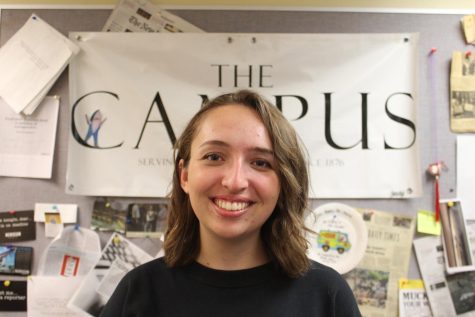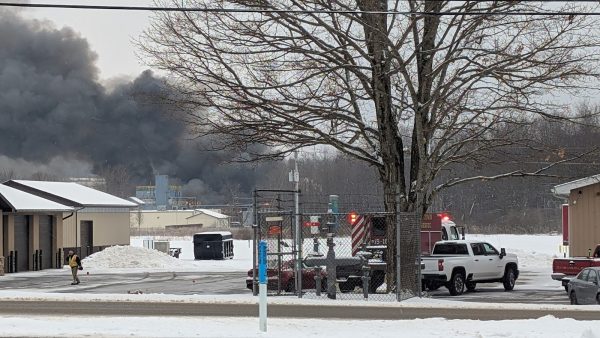Declaration Day: faculty weigh in on why their majors matter
WHAT IS DECLARATION DAY?
By AMY STEARNS
Declaration Day is Friday, March 24, 12 to 3 p.m. in Pelletier Library. It is a drop-in event. Declaration Day provides resources for students who are exploring and have questions about the declaration process and helps those who have already declared to celebrate this important milestone. Highlights include a free “I declared” T-shirt for students who declared this year, a nacho bar with all the fixings, a photo booth to celebrate declaring, an “I declared” board that students can put their major/minor gator on, and key campus resources available for students to talk to and learn about building their best Allegheny experience now that they have an academic focus — Gator2Gator, Study Away, Community Engagement, Career Ed, Pre-Law/Fellowship/3+2 Programs, Research and Pre-Health.
ART, SCIENCE, AND INNOVATION
From ALLEGHENY.EDU/ART
Art, Science, and Innovation is an interdisciplinary major that prepares students to become cultural innovators and critical makers prepared to produce works of visual art that can transcend disciplinary boundaries and promote greater cultural and technological awareness, while creatively contributing to STEM fields. Students work at the intersections of art, science, culture, and technology to develop the technical skills and critical capacities required to lead, create and innovate in their artistic practice and in any number of commercial applications.
BIOCHEMISTRY
By IVELITZA GARCIA
Why biochemistry? You can look up stats and various scientific impacts on society to realize that biochemistry is the most influential science. This fact is not a reason to major in biochemistry. We must go beyond the surface! When reflecting on the individual disciplines of chemistry, biology, physics, medical science and math, do you realize that these individual fields do not reflect the broad spectrum of your interests? Do you want to be the type of scientist who “levels up” in every game and then turns to help others do the same? My answers are a resounding “yes!” If you also answered “yes,” then you have found your scientific home!
BIOLOGY
By BRADLEY HERSH
Biology is so very broad that everyone has a different way in. Whether you are interested in tromping around streams collecting salamanders or studying how microbes transmit diseases or understanding the nearly invisible events inside a cell, biology includes all of it — and a lot, lot more! I got hooked by Punnett squares — little charts to predict what offspring will look like across generations — though now I try to convince my students there are better and easier ways to do the same thing! What we don’t know about how organisms work is vast, so biologists always have compelling paths to explore.
BUSINESS AND ECONOMICS
By TOMAS NONNENMACHER
Business and Economics majors ask important questions about the choices that people, organizations and societies make every day. They learn models and empirical tools to help answer those questions. The two majors are appropriate for students who like applying rigorous thinking to real world problems and are willing to think through both the immediate and the unintended consequences of their proposed solutions. How does inflation affect income inequality? How should businesses address climate risk? What effects would cryptocurrency regulation have? These are some of the many questions that motivate our majors.
CHEMISTRY
By TIM CHAPP AND CHEMISTRY SENIORS
A very scientific and unbiased poll of graduating chemistry majors reveals why you should declare a chemistry major. Each one-sentence response has been linked into a short and somewhat comprehensible paragraph:
Chemistry involves encountering many interesting real-world scientific scenarios. I enjoy chemistry and biology but not plants. Because science is cool, and chemistry is the coolest. I wanted to challenge myself and gain important skills. I didn’t want to take any biology classes. I gained relationships far beyond the scope of chemistry.
COMMUNICATION AND CULTURAL STUDIES
By MICHAEL MEHLER
We ask students to think about everything around them and ask critical questions about how culture is formed through media and public communication. Students ask how advertising shapes our images of self and consumer habits; how media and corporate structures shape our experiences and identities; and how communication strategies impact how we think about our communities and public actions. Our majors are prepared to navigate the world — no matter the unpredictable ways in which it will change — by being aware of what is happening at and below the surface in their media feeds.
COMMUNITY AND JUSTICE STUDIES
By HEATHER MOORE ROBERSON
Community & Justice Studies started as the Values, Ethics, and Social Action minor in 2000 and grew with support from faculty, students and staff. VESA was officially renamed to COMJ in 2014, in part, as a student-led effort to create a more inclusive Allegheny College. In COMJ, we are committed to critical investigations of institutional structures. We learn how race, equity, gender and other identity formations influence the worlds we occupy. We also prioritize the perspectives of community members and leaders throughout northwestern Pennsylvania who often serve as co-educators inside our courses.
COMPUTER SCIENCE
By COMPUTER AND INFORMATION SCIENCE FACULTY
Computer Science focuses on how hardware and software interact using scientific and design-centric approaches. This major develops students who can design, implement, evaluate and deliver devices into an increasingly software-saturated and device-mediated culture. As the roles these devices play is increasingly critical to society at large, computer science majors have an opportunity to confront issues inherent in the design and implementation of systems that are deeply embedded in daily life.
DATA SCIENCE — COMING FALL 2023
By COMPUTER AND INFORMATION SCIENCE FACULTY
Data Science constitutes a necessarily broad, interdisciplinary field encompassing statistics, computational code and processes and specific subject or knowledge domains. Given that data is a product of values-inflected platforms, there is no data product which is inherently unbiased. Data Science majors confront the need of our students to pursue personal and civic responsibility of using and interpreting data with the ultimate goal of using, for instance, machine learning algorithms and data science dashboards to support ethical decision making.
ENGLISH
By ENGLISH FACULTY
If you hate reading, stop reading this right now. But if you love words — if you’ve ever been moved by them, consoled by them or had your mind changed by them — why deny yourself the chance to spend four years learning how they work? It’s an opportunity that only comes once in a lifetime. English lets you study the power of words and teaches you how to wield that power to know yourself, connect with others and lay a foundation for a life filled with meaning.
ENVIRONMENTAL SCIENCE AND SUSTAINABILITY
RICH BOWDEN: Planet Earth needs a dedicated and optimistic crew of artists, poets, ecologists, writers, energy and natural resource experts, policy specialists and educators to keep our starship traveling sustainably through the universe.
ADRIENNE KRONE: I came to ESS through my research on religion, ethics, agriculture and food. There is space for everyone in this department because the only way to solve big problems like climate change and social injustice is to bring people with diverse perspectives together.
ERIC PALLANT: Socks and sandals, my friend. Socks and sandals.
GLOBAL HEALTH STUDIES
By KENNETH PINNOW AND GHS MAJORS
Global Health Studies is an excellent option for those who are passionate about addressing health inequalities and improving health outcomes. It offers a combination of academic rigor, real-world relevance and meaningful impact. The GHS program promotes interdisciplinary learning, equips students to work with qualitative and quantitative information and combines readily with other disciplines. Some GHS students are also pre-health and gain an understanding of population health topics that are not covered in medical school. GHS students are prepared to make a difference in a wide range of health-related careers both at home and abroad.
HISTORY
By HISTORY FACULTY
To be a historian is to be a time-traveling detective. We explore forgotten voices and perspectives from across the globe. We search for evidence that challenges and expands the simple factual narrative. Join us to uncover an ever-shifting landscape that defines who we were, who we are, and who we wish to become. We shape who tells our story.
INFORMATICS
By COMPUTER AND INFORMATION SCIENCE FACULTY
Informatics students focus on critical approaches to information and technology by developing ethical and technical frameworks and applying them to a wide-ranging set of culturally-relevant problems such as investigating technologies of intimacy or social justice issues inherent in metadata. Informatics engages students through information/media theory and practical application of lessons learned. These give students an understanding of how information can further diversity, equity, and inclusive technologies and practices.
INTERNATIONAL STUDIES
By LAURA REECK
While completing my PhD in French, I took a course on North African history and immigration to France. The professor pulled me aside after a presentation on North African immigration in France in the 1970s and asked me what I wanted to do after the PhD, and I said “this.” I gravitated toward International Studies’ multi-dimensional approach for asking and answering questions using cultural, systems and world-regional perspectives, in both their complementarity and dissonance. I like that it infers that no one subset of disciplinary knowledge or methods is sufficient, which opens up questions about how we know what we know.
MATHEMATICS
By CRAIG DODGE
I have taken comfort in the epistemological authority of mathematics. No truths are as absolute as those like the Pythagorean Theorem. Unfortunately, mathematics has also made clear that the only things I know for certain are founded upon fundamental assumptions, which may very well be false. While I may disagree with someone’s conclusions, I have to recognize that those conclusions may be drawn from equally valid axioms. My growth as a person is framed by the discipline of mathematics, constantly assessing and revising my own postulates by examining the consequences logically propagating from them.
NEUROSCIENCE
By JEFF HOLLERMAN
Everyone has a brain. Even the person that you are thinking right now doesn’t have one, actually does. We use our brains for, literally, everything we do. Getting up in the morning. Walking to class. Learning. Speaking with friends. Eating and drinking, listening to music, playing music, dancing to music: in the art studio and in the chemistry lab, your brain is at work. Maybe not always working as well as you might like, but it is at work. Doesn’t it seem like it is worth having an idea of just how it works? Neuroscience can give you that.
PHILOSOPHY
By ERIC PALMER
Why a philosophy major? Well, why are you here? That’s actually a familiar question in philosophy classes. Journalist Will Bunch ruminates on it in “After the Ivory Tower Falls” — a book worth reading, if you’re considering why you’re here. Bunch cites a survey of California students: “between 1971 and 2009, the number of freshmen … who placed importance on ‘developing a meaningful philosophy of life’ plunged from 73 to 48%, while the number who stressed becoming ‘well-off financially’ soared from 37 to 78%.” Why the shift? Does it make you wonder? The goals aren’t mutually exclusive. And if they were, what then?
PHYSICS
By ADELE POYNOR
Are you curious about how the world works? Do you want to be at the forefront of ideas in science and technology? If so, then declaring a physics major may be right for you. A physics major helps you develop problem-solving skills that can be applied to a wide variety of disciplines. It also gives you an opportunity to gain a deep understanding of the universe. Our physics major gives you access to research and internship opportunities that will further your knowledge and expertise in both physics and related fields.
POLITICAL SCIENCE
By BRIAN HARWARD
Political scientists are interested in patterns of political phenomena and seek explanations for those patterns. Why do countries go to war? Why are some climate policies adopted and not others? What are the connections between insecurity and immigration? What role do mass movements play in shaping elite behavior? Under what conditions can courts bring about social change? You’ll find these, and many other questions, are at the heart of our classes and student research in Political Science.
PSYCHOLOGY
By PSYCHOLOGY FACULTY
Why should you declare a psych major? Because psychology is the study of thought, feelings, and behavior — so, if you’re a human who thinks, feels and behaves (or misbehaves) and if you have an animal that behaves (or misbehaves), and you want to know why, we’ve got you covered! Need more reasons? We have cool faculty, cool classes and you can learn how to answer your own questions empirically.
SOFTWARE ENGINEERING — COMING FALL 2023
By COMPUTER AND INFORMATION SCIENCE FACULTY
Software engineering focuses on the knowledge and skills that teams and individuals need to develop and maintain large-scale software systems. As students prepare to contribute to the software engineering field — potentially working on key critical systems that support education, finance or the distribution of electrical power — they develop into personally and professionally responsible contributors. Software engineers consider civic morality and broader impacts of their decisions, confronting issues of power, privilege and difference as primary concerns.
STUDIO ART
From ALLEGHENY.EDU/ART
The Studio Art program prepares students to become practicing artists with a particular emphasis on critically engaging with their medium, while addressing urgent cultural issues through their making. The Studio Art major is a BA program that allows students to fully immerse themselves in Allegheny’s liberal arts tradition toward bringing the knowledge gained across disciplines into their creative practice. The Studio Art program offers concentrations in ceramics, painting, photography, painting, and sculpture.
THEATRE
By MICHAEL MEHLER
A major in Theatre at Allegheny is unique. There are a lot of schools where students work on technique for 4 years. Allegheny Theatre majors learn technique through courses in acting, design and directing, too, but technique alone is not our end goal. Here, majors spend four years finding and developing their voices as cultural artists. They do so by discussing how artists and institutions have made theatre in the past and by exploring how many different types of theatre are being made now. The Theatre major is concerned less about how theatre is made and more concerned with why it’s made — the impact it can have on audiences and communities.
WOMEN’S, GENDER, AND SEXUALITY STUDIES
By WGSS FACULTY
Women. Gender. Sexuality. They are not abstract words. We live in our bodies and in the world every day, and every day we interpret each other’s bodies and our bodies are interpreted all the time. If thinking about bodies, sexualities, race and gender interests you, then WGSS is where you want to be! WGSS is an interdisciplinary field that explores and imagines these concepts and how they affect our daily lives. We don’t take anything for granted and, as a field, we think that transformation and justice are both imaginable and possible.
WORLD LANGUAGES AND CULTURES
By BRIANA LEWIS
I initially chose to study a language because it was fun to communicate in a whole new way. The better I got at it, the more fun it became — especially once I spent time abroad and got to use my skills in “real” situations. But the surprise came when I enjoyed studying literature in my second language more than I ever had in English. Somehow, the language being less familiar made it feel more expressive, and I became more attentive to the subtleties of language — in literature, in other verbal art forms, and in life — in both French and English!

Sydney Emerson is a member of the class of 2023. She is from Bradford, Pennsylvania and is an English major with a history minor.










